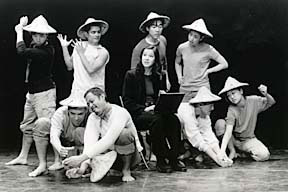|
by Welly Yang, C. Matthew Eddy, Brian Yorkey, and Woody Pak At the Taipei Theater Reviewed by David Roberts for Theatre Reviews Limited
 Like "The Irish and How They
Got That Way", "Rags", and "Ragtime", Second Generation's "Making Tracks"
is a musical about immigrant persons trying to find their way to and in a
new land, in this case the United States. Like "Golden Child," "Making
Tracks" deals somewhat with the collision of old and new worlds and the
effect of such a collision on the way of life and moral values of the old
world. Like "The Irish and How They
Got That Way", "Rags", and "Ragtime", Second Generation's "Making Tracks"
is a musical about immigrant persons trying to find their way to and in a
new land, in this case the United States. Like "Golden Child," "Making
Tracks" deals somewhat with the collision of old and new worlds and the
effect of such a collision on the way of life and moral values of the old
world.Billed as "a new Asian-American rock musical," Welly Yang's "Making Tracks" works best when he and his co-authors use the "storytelling" convention to trace the history of Asian-American immigrants and the joys and sorrows they experienced trying to "assimilate" into American culture. The actors rightly affirm that "telling the tale...makes us more human" and after an energetic opening ("One More Mile") the audience is introduced to "Grandmother" (Virginia Wing) who is being visited in a Newark, New Jersey Hospital (in the present) by her "Granddaughter" (Kiki Moritsugu). In a quite creative fashion, the grandmother remains on stage almost throughout the musical telling the story from the point of view of immigrants who worked for the railroads in the l860's laying track ("making tracks"), picture brides, those living in internment camps during World War II, up to the present lives of the Asian American engineers who are building the high-tech backbone of America. The action moves back and forth from the present to 1865, to 1918, to 1922, to 1941 and 1942. In the eleven scenes and seventeen songs the audience experiences the "coming of age" of the immigrants and they realize there "are no kings in America" and that their vision of what life would be like in America was far from the reality they experienced. But what these struggling new Americans had come "from" was not ideal either. One character affirms that he would "rather commit suicide than return to China." The Asian American are the objects of racism (the horror of the internment camps, hearing phrases like "we don't cut Jap [sic] hair." But the show doesn't gloss over the racism of the immigrants either who at one point refer to an Irish American as "a big loud drunk person." If anything, the musical shows the degradation caused by racism no matter what its source. The program did not indicate there would be an interval but one occurred rather unexpectedly after the ninth scene. The second act proved to be much too long, particularly the unnecessary "Up with People" like number "The New Frontier." Had the creative team trusted the material they had, this interval would not have been necessary and much of the material in the second act could have been shortened or omitted. There is enough here for one very good one act musical. There is not yet enough here for two full acts. The considerable accomplishments of Asian Americans is apparent to the audience throughout the musical and reprising all these accomplishments in one overly perky number late in the second act is neither necessary nor helpful to the piece as a whole. The strength of the musical is in the cast and in the songs and in the story telling which gives us lines like, "We only have each other" and "You cannot fence the heart in." Let the story stand on its strength. The frills are not necessary. Asian Americans "made tracks" in the latter half of the nineteenth century and are "making tracks" into the new millennium with much grace and skill. See this musical and enjoy. Reviewed on Tuesday, February 2, 1999 |
